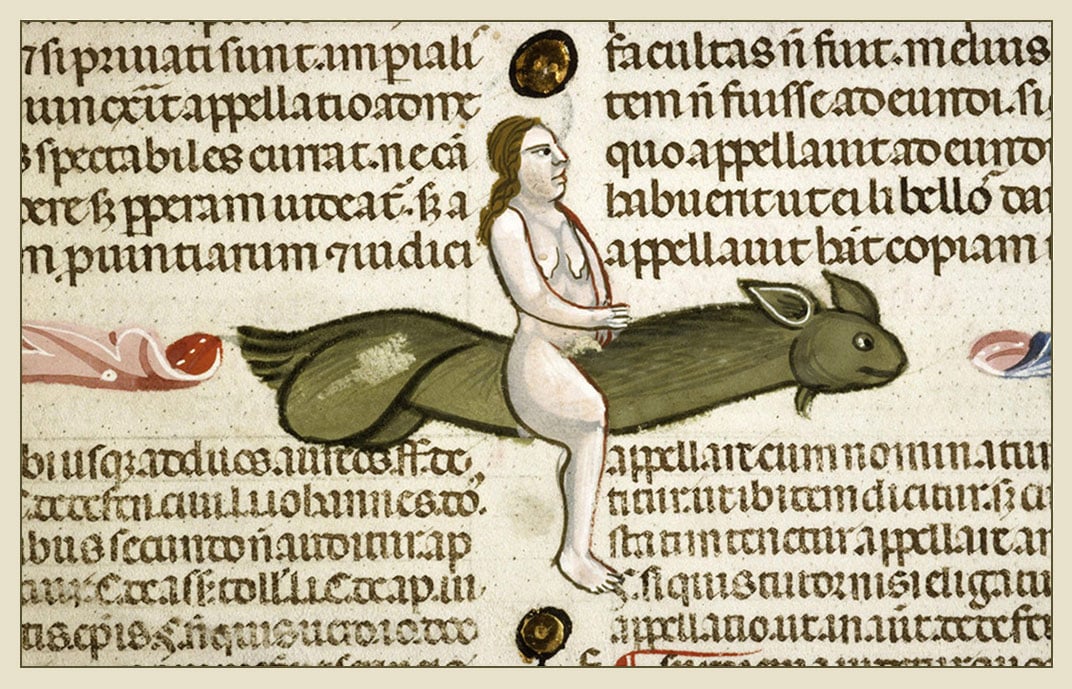When we talk about masturbating now, most of us don’t immediately think of women. Instead, the term conjures up ideas of men, who we often consider as the more overtly sexual gender. For ancient and medieval people, however, onanism, the Latin term for wanking, was perhaps more likely to be associated with women. Indeed, women were considered to be the oversexed bunch for thousands of years. As the ancient Greek myth of Tiresias, a man who was turned into a woman, and then back into a woman attested, according to the hero who had experienced sex as both genders, “If the parts of love pleasure be counted as ten/Thrice three go to women, only one to men.” If sex was such a profoundly pleasurable experience for women, no wonder that they were likely to enjoy it alone.
Masturbation wasn’t seen as manly
In fact, when medieval people talked about masturbation at all, even for men, it was considered a feminine activity. The early medieval theologian Isidore of Seville insisted that men who enjoyed solo sex in medieval times were effeminate, and dishonoured the natural vigor of their gender with the languor and sensuality that women were known to enjoy. This is because masturbation was thought of as surrendering to readily available pleasure, a quality which was considered inherently feminine.
This susceptibility to sexual pleasure was often described in women as an “openness”. Women were simply more likely to notice that something could be pleasurable. As a result, they were also thought of as much more likely to ignore the religious guidelines of the Church.
Was solo sex in medieval times a sin?
Masturbation for any good Christian, man or woman, was considered a sin by any and all medieval theologians, though its seriousness was a matter for debate. Most considered it a personal failing between oneself, God, and their confessor. In the thirteenth century, the philosopher Thomas Aquinas argued that it was actually more problematic than that because it was illogical. Sex with yourself couldn’t possibly result in having children, the only “logical” reason to have sex from a religious standpoint. It was therefore necessarily sinful in and of itself, as were those who indulged in it. In the later medieval period, this interpretation was sometimes used to condemn wanking as a serious problem. The fourteenth-century theologian Jean Gerson, for example, considered that solo sex in medieval times was such a frightful sin that only a Bishop could forgive those who were open to its delights.
The sinful nature of masturbation meant, once again, that it was a feminine pastime. Just as women were more open to pleasure, they were also open to sin for pleasure’s sake. After all, women’s willingness to do something sinful for fun went right back to the Garden of Eden when Eve thought a tasty fruit was worth gambling the immortal souls of humanity as a whole for all eternity. If something was sexy and a sin, women were considered more likely to do it, and enjoy it.
While the Church might have warned of the sin that accompanied masturbation, some physicians had different thoughts, especially when it came to women. Most medieval medical writers, following ancient Greek thinkers such as Galen and Aristotle, believed that women, like men, expelled semen when they orgasmed. The thinking was that this semen mixed with men’s in the womb, then implanted, making women pregnant.
Was there a need for more orgasms?
This led to the concern that if women were not having enough orgasms there could be serious consequences. Galen had posited that if women did not flush out their semen through orgasm it could build up to the point that it suffocated the womb. To make sure that this did not happen he recommended that medical practitioners, such as physicians or midwives, place hot poultices on the genitals of women who were sexually deprived, effectively masturbating them. As the medieval period wore on, and strictures against masturbation grew more stringent, medical masturbation fell out of fashion. Instead, women were encouraged to marry in order to increase their orgasm quota in a proper Christian way.
What all of the handwringing, both theological and medical, about women, orgasms, and masturbation shows us is that women enjoying female masturbation in medieval times was considered an unfortunate inevitability. Women were absolutely going to masturbate, and there was nothing that anyone could do about it.
It was the women that were called out for self-pleasure
Then as now, there was also much whispering about exactly how it was that women enjoyed their alone time. Penitentials, the guidebooks that priests used to know what to ask people during confession, warned of women using “…certain instruments of diabolic function to excite desire”. If that seems oblique, the Penitential of Buchard of Worms made it more explicit, telling priests to ask their parishioners, “Have you done what certain women are accustomed to do, that is, to make some sort of device or implement in the shape of the male member, of the size to match your desire … have [you] fornicated with yourself with the aforementioned device or some other device?” In other words, “Have you made a dildo? Have you fucked yourself with that dildo, or anything else you have lying around?” The creative women seeing to their own pleasure in these ways were instructed that they were very bad indeed, and “…shall do penance for one year on legitimate holy days.”
At times, some theologians considered what we would call lesbian sex to be essentially a form of masturbation. The Penitential of Theodore, for example, recommends that “If a woman practices vice with a woman, she shall do penance for three years. If she practices solitary vice, she shall do penance for the same period.” In other words, if there is no living penis, sex can never be elevated above wanking, even when medieval women used strap-ons and double-ended dildos together, both of which we have evidence for.
As far as medieval people were concerned, masturbation was a woman’s game. It had all the hallmarks of being feminine—it was sinful, easy, and temptingly sensual. Try as they might, there was little hope that either the Church or society could stop women from pleasuring themselves. The best they could do was warn against it, and ask about it. I will leave it to you to decide whether the asking was purely out of concern for any given woman’s soul, or born from a desire to know exactly what women get up to when they are alone.



